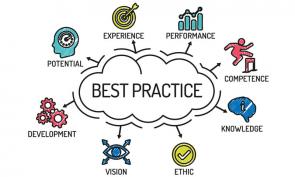
Don't Just Stay in Touch — Stay Connected
In uncertain times, your clients want your strategic advice, not just your legal bills. In an economic downturn like the US (and the world) is now experiencing, you can bet that your clients are concerned about the future — not just of their company, but their own futures as well. Too many partners see themselves narrowly as legal services providers, while clients often look to their outside lawyers for broader advice and guidance. Clients crave outside lawyers who know their business, in good and bad times, and who regularly play a broader role as advisors. If you have been doing your job right, your clients trust your advice and want your guidance, even if they don't always ask. Demonstrating to your clients that you can — and want to — engage in a broader advisory role will cement your relationship with the company and ensure that you are the person who is contacted in times of need, legal or otherwise. What are the best ways to put yourself on the fast track to a trusted advisor role with your client? Here are a few suggestions:
- Connect with your clients regularly to check in, not just when you are hunting for new business or have news about one of their legal matters (or when you have the firms' Lakers tickets). Yes, clients are busy and don't want to be constantly harassed, but most will appreciate you checking in for 5-10 minutes every week or two just to say hello and to find out how they are coping with tough times. And of course, regularly talking to your client will give you insight as to internal company matters that may not quite require opening a new matter, but might be a topic worth bouncing off a trusted advisor in an informal call.
- Add Google News Alerts for each of your clients to get immediate, daily, or weekly digest emails with links to news articles mentioning them. Although your firm's marketing department may already monitor client news, seeing the news regularly yourself will allow you to discuss, in real time, current events facing the client (or even perhaps alert your client to a newsworthy, but not necessarily legal, development). All you need to do is set aside a couple of minutes a day (or week) to skim and delete the alerts, mentally filing away a few facts for the next time you talk with the client. An investment of these few minutes in your client will almost certainly yield hours of work for you and your firm down the road.
- Investigate the effects of the current economy on your clients' operations and be proactive about determining if other partners with your firm (or other clients of yours) may be able to help. For example, if your client is a manufacturer for whom you primarily have been providing M&A and securities advice, determine if they are in the midst of considering layoffs or plant closures. If so, offer up an informal call with one of your partners in your firms' labor and employment group to provide strategic guidance and counseling about the process. This sounds obvious, but if you wait until the news hits the wire, it's too late. Show your client that you care about their business by being proactive, not just reactive.
- Invite your client to an outside speaking engagement or panel discussion where you or other members of your firm are presenting. This will not only give you a chance to interact with the client in an outside professional atmosphere (where you can demonstrate your legal prowess), but also may help the client satisfy some much-needed MCLE requirements. Better yet, invite the client to an internal MCLE presentation in your office. Again, this lets the client see you in a professional atmosphere and will also allow them to see and interact with others at your firm who may be able to provide professional services.
- Think twice about inviting the client to a lavish meal at an exclusive restaurant or hosting them in the firm's luxury box at a sporting event, at least for now. If the reality of the client's world is large reductions in revenue, staff layoffs, and decreasing departmental budgets, such an event may not make the kind of ''connection'' you want. Instead, it may give the impression of how disconnected you and your firm are from the economic realities facing your client. A simple lunch or stopping by for a coffee may send a better message.
Use Your Down Time to Upgrade Your Client List
As noted above, the realities of the global slowdown are leading most companies to look for ways to shave expenses, including legal fees. Companies taking action to implement a reduction in their legal budgets may actually translate into opportunities for you to increase your book, although you'll need to do some legwork to make this happen. Here are some ideas that may help you grow your book in the face of diminishing legal budgets:
- One way companies often seek to reduce costs is by reducing redundancy and implementing cost structure efficiencies, both internally and externally. While they may have been willing to deal with five, six, or even 20 firms in the past to spread work around, now they may be looking to save time — and money — by consolidating more of their legal work with one firm and negotiating a more favorable fee agreement. If you know that your client historically has used your firm for some, but not all, of its legal needs, it may be a good time to approach the client and make a pitch to handle a larger slice of the company's legal needs. Again, even if you are rebuffed, it will demonstrate that you are in tune with the client's objectives and trying to work with them to lower costs.
- Another tactic for lagging economic times might be to revisit clients to whom you have made unsuccessful pitches over the past few years to check in with them to see whether they are happy with the firm they chose over yours. If a client is not happy with its current firm but hasn't made a decision to shift work to someone else (perhaps largely due to inertia), now might be a good time to remind them that your firm could be doing the job better and more efficiently. Even if it doesn't lead to an immediate transfer of work to you, it may result in the next pitch going more favorably.
- One thing that most firms talk about but rarely do is cross-sell. In today's slower business times, it would benefit you to actually cross-sell your clients to other partners at your firm instead of just discussing how great it would be every year at the firm meeting, and then never following up. One way for you to increase your book is to show your partners that you are ready and willing to cross-sell your clients to them if they will do the same for you. To properly cross-sell, you need to get more acquainted with your clients' needs (as discussed above), and then make a list of partners at your firm who have a skill set that could help the client with the legal and strategic issues facing the client right now. Then go and talk with those partners (right now) and set up informal lunches or meetings (right now) with your clients to make the necessary introductions. Even if the meetings are informal and low-key, the expression of interest will be appreciated by the clients as a showing that you are thinking about their immediate needs. And, even if your cross-selling efforts don't result in an infusion of new business right away, they will be remembered and much appreciated both by the clients and your fellow partners, who will almost certainly return the favor by introducing you to their clients that you may be able to help. Don't be shy about approaching your partners to discuss cross-selling opportunities that may result in more work for you with your partners' clients. Cross-selling is a win-win-win — for you, your partners, and the client — and it actually works, but the trick is you have to do more than just talk about it.
Conclusion
Slower economic times don't necessarily mean that your book of business can't grow. In fact, if you take a few of the steps discussed above, are proactive, and take advantage of opportunities (while others may be content with the status quo), you might just see your book prosper while others' shrink.
About Harrison Barnes
No legal recruiter in the United States has placed more attorneys at top law firms across every practice area than Harrison Barnes. His unmatched expertise, industry connections, and proven placement strategies have made him the most influential legal career advisor for attorneys seeking success in Big Law, elite boutiques, mid-sized firms, small firms, firms in the largest and smallest markets, and in over 350 separate practice areas.
A Reach Unlike Any Other Legal Recruiter
Most legal recruiters focus only on placing attorneys in large markets or specific practice areas, but Harrison places attorneys at all levels, in all practice areas, and in all locations-from the most prestigious firms in New York, Los Angeles, and Washington, D.C., to small and mid-sized firms in rural markets. Every week, he successfully places attorneys not only in high-demand practice areas like corporate and litigation but also in niche and less commonly recruited areas such as:
- Immigration Law
- Workers Compensation
- Insurance
- Family Law
- Trust and Estate
- Municipal law
- And many more...
This breadth of placements is unheard of in the legal recruiting industry and is a testament to his extraordinary ability to connect attorneys with the right firms, regardless of market size or practice area.
Proven Success at All Levels
With over 25 years of experience, Harrison has successfully placed attorneys at over 1,000 law firms, including:
- Top Am Law 100 firms such including Sullivan and Cromwell, and almost every AmLaw 100 and AmLaw 200 law firm.
- Elite boutique firms with specialized practices
- Mid-sized firms looking to expand their practice areas
- Growing firms in small and rural markets
He has also placed hundreds of law firm partners and has worked on firm and practice area mergers, helping law firms strategically grow their teams.
Unmatched Commitment to Attorney Success - The Story of BCG Attorney Search
Harrison Barnes is not just the most effective legal recruiter in the country, he is also the founder of BCG Attorney Search, a recruiting powerhouse that has helped thousands of attorneys transform their careers. His vision for BCG goes beyond just job placement; it is built on a mission to provide attorneys with opportunities they would never have access to otherwise. Unlike traditional recruiting firms, BCG Attorney Search operates as a career partner, not just a placement service. The firm's unparalleled resources, including a team of over 150 employees, enable it to offer customized job searches, direct outreach to firms, and market intelligence that no other legal recruiting service provides. Attorneys working with Harrison and BCG gain access to hidden opportunities, real-time insights on firm hiring trends, and guidance from a team that truly understands the legal market. You can read more about how BCG Attorney Search revolutionizes legal recruiting here: The Story of BCG Attorney Search and What We Do for You.
The Most Trusted Career Advisor for Attorneys
Harrison's legal career insights are the most widely followed in the profession.
- His articles on BCG Search alone are read by over 150,000 attorneys per month, making his guidance the most sought-after in the legal field. Read his latest insights here.
- He has conducted hundreds of hours of career development webinars, available here: Harrison Barnes Webinar Replays.
- His placement success is unmatched-see examples here: Harrison Barnes' Attorney Placements.
- He has created numerous comprehensive career development courses, including BigLaw Breakthrough, designed to help attorneys land positions at elite law firms.
Submit Your Resume to Work with Harrison Barnes
If you are serious about advancing your legal career and want access to the most sought-after law firm opportunities, Harrison Barnes is the most powerful recruiter to have on your side.
Submit your resume today to start working with him: Submit Resume Here
With an unmatched track record of success, a vast team of over 150 dedicated employees, and a reach into every market and practice area, Harrison Barnes is the recruiter who makes career transformations happen and has the talent and resources behind him to make this happen.
A Relentless Commitment to Attorney Success
Unlike most recruiters who work with only a narrow subset of attorneys, Harrison Barnes works with lawyers at all stages of their careers, from junior associates to senior partners, in every practice area imaginable. His placements are not limited to only those with "elite" credentials-he has helped thousands of attorneys, including those who thought it was impossible to move firms, find their next great opportunity.
Harrison's work is backed by a team of over 150 professionals who work around the clock to uncover hidden job opportunities at law firms across the country. His team:
- Finds and creates job openings that aren't publicly listed, giving attorneys access to exclusive opportunities.
- Works closely with candidates to ensure their resumes and applications stand out.
- Provides ongoing guidance and career coaching to help attorneys navigate interviews, negotiations, and transitions successfully.
This level of dedicated support is unmatched in the legal recruiting industry.
A Legal Recruiter Who Changes Lives
Harrison believes that every attorney-no matter their background, law school, or previous experience-has the potential to find success in the right law firm environment. Many attorneys come to him feeling stuck in their careers, underpaid, or unsure of their next steps. Through his unique ability to identify the right opportunities, he helps attorneys transform their careers in ways they never thought possible.
He has worked with:
- Attorneys making below-market salaries who went on to double or triple their earnings at new firms.
- Senior attorneys who believed they were "too experienced" to make a move and found better roles with firms eager for their expertise.
- Attorneys in small or remote markets who assumed they had no options-only to be placed at strong firms they never knew existed.
- Partners looking for a better platform or more autonomy who successfully transitioned to firms where they could grow their practice.
For attorneys who think their options are limited, Harrison Barnes has proven time and time again that opportunities exist-often in places they never expected.
Submit Your Resume Today - Start Your Career Transformation
If you want to explore new career opportunities, Harrison Barnes and BCG Attorney Search are your best resources. Whether you are looking for a BigLaw position, a boutique firm, or a move to a better work environment, Harrison's expertise will help you take control of your future.
Submit Your Resume Here to get started with Harrison Barnes today.
Harrison's reach, experience, and proven results make him the best legal recruiter in the industry. Don't settle for an average recruiter-work with the one who has changed the careers of thousands of attorneys and can do the same for you.
About BCG Attorney Search
BCG Attorney Search matches attorneys and law firms with unparalleled expertise and drive, while achieving results. Known globally for its success in locating and placing attorneys in law firms of all sizes, BCG Attorney Search has placed thousands of attorneys in law firms in thousands of different law firms around the country. Unlike other legal placement firms, BCG Attorney Search brings massive resources of over 150 employees to its placement efforts locating positions and opportunities its competitors simply cannot. Every legal recruiter at BCG Attorney Search is a former successful attorney who attended a top law school, worked in top law firms and brought massive drive and commitment to their work. BCG Attorney Search legal recruiters take your legal career seriously and understand attorneys. For more information, please visit www.BCGSearch.com.
Harrison Barnes does a weekly free webinar with live Q&A for attorneys and law students each Wednesday at 10:00 am PST. You can attend anonymously and ask questions about your career, this article, or any other legal career-related topics. You can sign up for the weekly webinar here: Register on Zoom
Harrison also does a weekly free webinar with live Q&A for law firms, companies, and others who hire attorneys each Wednesday at 10:00 am PST. You can sign up for the weekly webinar here: Register on Zoom
You can browse a list of past webinars here: Webinar Replays
You can also listen to Harrison Barnes Podcasts here: Attorney Career Advice Podcasts
You can also read Harrison Barnes' articles and books here: Harrison's Perspectives
Harrison Barnes is the legal profession's mentor and may be the only person in your legal career who will tell you why you are not reaching your full potential and what you really need to do to grow as an attorney--regardless of how much it hurts. If you prefer truth to stagnation, growth to comfort, and actionable ideas instead of fluffy concepts, you and Harrison will get along just fine. If, however, you want to stay where you are, talk about your past successes, and feel comfortable, Harrison is not for you.
Truly great mentors are like parents, doctors, therapists, spiritual figures, and others because in order to help you they need to expose you to pain and expose your weaknesses. But suppose you act on the advice and pain created by a mentor. In that case, you will become better: a better attorney, better employees, a better boss, know where you are going, and appreciate where you have been--you will hopefully also become a happier and better person. As you learn from Harrison, he hopes he will become your mentor.
To read more career and life advice articles visit Harrison's personal blog.





